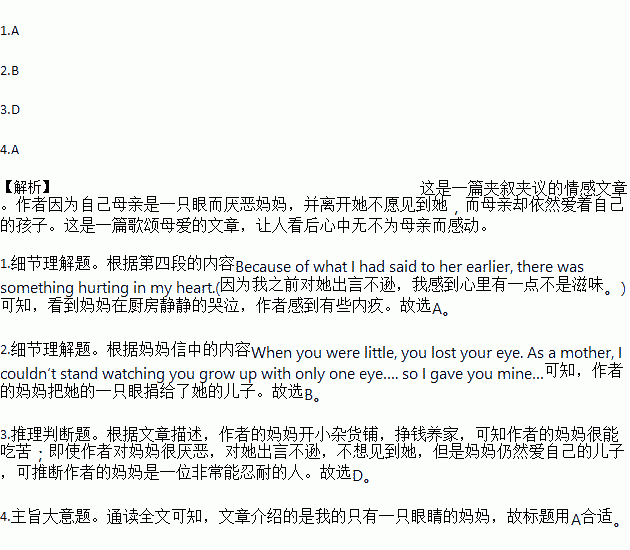题目内容
My mom was one-eyed. I hated her... She was such an embarrassment. She ran a small shop at a flea market to sell anything for the money we needed.
I remember it was field day, and my mom came. I was so embarrassed. I threw her a hateful look and ran out. The next day at school..., “Your mom only has one eye?!” and they teased me.
I wished my mom would disappear from this world, so I said to her, “Why don’t you have the other eye?! You’re only going to make me a laughing stock. Why don’t you just die?” She didn’t respond. I guess I felt a little bad, but meanwhile, it felt good to think I said what I’d wanted to say.
That night, I woke up, and went to the kitchen to get water. My mom was crying quietly. I looked at her, and turned away. Because of what I had said to her earlier, there was something hurting in my heart. Even so, I hated my mother who was crying from her one eye. So I told myself I would grow  up and become successful, because I hated my one-eyed mom and our poverty.
up and become successful, because I hated my one-eyed mom and our poverty.
Then I left her and got accepted in the Seoul University. Then, I got married. I bought a house then had kids. Now I’m living happily as a successful man. I like it here because it’s a place that doesn’t remind me of my mom.
This happiness was getting bigger when someone unexpected came to see me. It was my mom... Still with her one eye. My little girl ran away, scared of her eye.
I screamed at her, “How dare you come to my house and scare my daughter! Get out of here now!!” And to this, my mother quietly answered, “Sorry. I may have gotten the wrong address.” and she disappeared. Thank goodness. She doesn’t recognize me. I was relieved. I told myself I wasn’t going to think about this for the rest of my life.
One day, a letter regarding a school reunion came to me. I lied to my wife saying I was going on a business trip. After the reunion, I went down to what I used to call a house. I found my mother fallen on the ground. She had a piece of paper in her hand. It was to me.
My son, I was glad when I heard you were coming for the reunion. But I decided not to go to the school. For you... sorry I only have one eye. When you were little, you lost your eye. As a mother, I couldn’t stand watching you grow up with only one eye, so I gave you mine. I was so proud of my son seeing a whole new world for me with that eye. I was never upset at you for anything you did. You mean the world to me.
My world fell apart. I hated the person who only lived for me. I didn’t know of any way that will make up for my worst deeds.
1.How did the author feel when he saw his mother crying quietly in the kitchen?
A. He felt guilty of what he had said to her.
B. He felt good to speak out all he’d wanted to say.
C. He felt sympathetic to what his mother had suffered.
D. He felt anxious about his mother’s health.
2.From the letter of the author’s mother, we can infer that _______.
A. she lost one eye in an accident
B. she donated one of her eyes to her son
C. she felt angry with her son sometimes
D. she attended the school reunion
3.The writer’s mother can be best described as ________.
A. kindhearted and helpful B. disabled and mean
C. graceful and respectable D. painstaking and tolerant
4.Which is the best title for this passage?
A. My one-eyed Mother B. Love Between Mother and Son
C. My Poor Family D. A Letter From My Mother
 名校课堂系列答案
名校课堂系列答案
